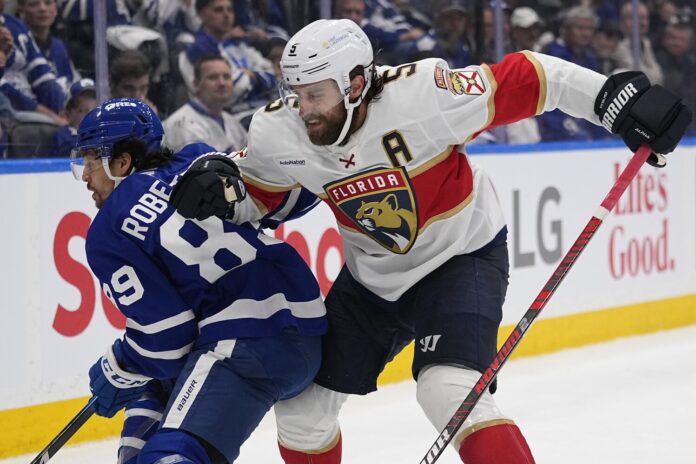Aaron Ekblad’s 2025 NHL season is a testament to resilience, accountability, and the high-stakes demands of elite hockey. Once the face of the Florida Panthers’ blue line, Ekblad’s career took a dramatic turn this spring when he became the first NHL player in seven years to be suspended for violating the league’s performance-enhancing drugs (PED) policy. His subsequent return has been a focal point of the Panthers’ drive to the Eastern Conference Finals, where they now face the Carolina Hurricanes in a rematch of last year’s epic series.
The Suspension: A First in Years
In March 2025, the NHL announced a 20-game suspension for Ekblad after he failed a random drug test, violating the NHL/NHLPA Performance Enhancing Substances Program. In his public statement, Ekblad expressed shock and regret, explaining that he took an undisclosed substance to aid recovery from injuries without consulting the team medical staff. He apologized to his teammates, the Panthers organization, and fans, accepting responsibility for his mistake and pledging to return stronger.
The NHL’s PED policy, governed by the Collective Bargaining Agreement, mandates a 20-game suspension for a first offense, along with a referral to the NHL/NHLPA Program for Substance Abuse and Behavioral Health for evaluation and possible treatment. The league’s prohibited substances list largely mirrors the World Anti-Doping Agency (WADA) standards, and players are subject to random, no-notice testing during the season and playoffs. This was Ekblad’s first career suspension, and the first PED-related suspension in the NHL in several years.
Ekblad’s suspension cost him the final stretch of the regular season and the first two games of the playoffs. Cleared to resume team activities in April, he returned to the lineup for Game 3 of the Panthers’ first-round series against the Tampa Bay Lightning. His presence was immediately felt: Ekblad resumed his role as a top-pair defenseman, logging significant minutes on both the power play and penalty kill, and providing leadership and stability to a team with championship aspirations.
Before his suspension, Ekblad had posted 33 points (three goals, 30 assists) in 56 games, averaging a team-high 23:31 ice time and a +11 rating. His return was hailed as a massive boost by teammates and coaches, who noted that Ekblad was in the best shape of his life and ready to anchor the defense.
2025 Playoff Performance
Since rejoining the Panthers, Ekblad has played in eight postseason games, recording two goals, four assists for six points, a +3 plus-minus rating, 24 penalty minutes, and an average of 22:18 time on ice per game. His contributions have helped Florida eliminate the Lightning in five games and rally from a 2-0 deficit to defeat the Toronto Maple Leafs in seven, propelling the Panthers to their third consecutive Eastern Conference Final.
Ekblad’s ability to step seamlessly into the lineup after such a high-profile setback underscores his physical preparation and mental resolve. His play has been instrumental in stabilizing the Panthers’ defense during high-pressure moments, and his offensive production from the blue line remains critical as Florida prepares to face Carolina.
PEDs, Supplements, and the NHL’s Fine Line
The NHL’s approach to performance-enhancing drugs is strict but nuanced. The league’s PED policy protects player health and maintains competitive integrity, with penalties for violations and mandatory education for all players. The prohibited substances list is negotiated with the NHLPA and is updated as needed, but the specifics are not always made public. Players are randomly tested, and any positive result for a banned substance results in automatic suspension and further evaluation.
Despite these regulations, the reality is that NHL players—like elite athletes in every sport—constantly seek legal ways to gain an edge, recover from injury, and manage the physical toll of an 82-game season plus playoffs. Legal supplements, such as protein powders, amino acids, creatine, various vitamins, and products like MK-677 liquid are ubiquitous in NHL locker rooms. These products can aid muscle recovery, reduce fatigue, and help players rebound from injuries more quickly, all while staying within league rules. Teams employ nutritionists and medical experts to ensure players’ supplement regimens are safe and compliant with the NHL’s guidelines.
However, the line between legal supplements and banned substances can be thin. The FDA does not regulate many over-the-counter products, and contamination or mislabeling can lead to inadvertent violations—a risk that Ekblad himself cited in his apology. This underscores the importance of constant vigilance and consultation with team medical staff, as even unintentional mistakes can have career-altering consequences.
Looking Ahead: Legacy and Lessons
Aaron Ekblad’s journey through suspension and redemption is a cautionary tale of resilience. As the Panthers chase another Stanley Cup, his return has galvanized the team and reminded the hockey world of the razor-thin margins at the highest level of sport. His playoff performance—on the ice and in the locker room—will be closely watched as Florida battles Carolina for a spot in the Stanley Cup Final.
Ekblad’s experience also highlights the ongoing challenge facing the NHL: balancing player safety, competitive fairness, and the relentless drive for performance in a league where victory and defeat can hinge on the smallest detail. For Ekblad and the Panthers, the hope is that his hard-earned lessons will translate into continued playoff success and, perhaps, another championship banner in Sunrise.




















